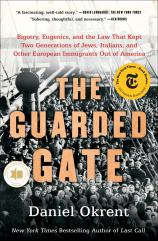The Guarded Gate: Bigotry, Eugenics, and the Law That Kept Two Generations of Jews, Italians, and Other European Immigrants Out of America
Review
The Guarded Gate: Bigotry, Eugenics, and the Law That Kept Two Generations of Jews, Italians, and Other European Immigrants Out of America
Casting light on a dark era in American sociopolitical history, author and editor Daniel Okrent (LAST CALL: The Rise and Fall of Prohibition) asserts that all of us have "a stake in this story."
The eugenics movement was quirky pseudo-science that grafted itself onto mainstream thinking in more ways than we might now care to admit. Charles Darwin's cousin, Francis Galton, was a genius who had learned to read at age two, knew Latin by age four and had a passion for counting. After reading Darwin's ON THE ORIGIN OF SPECIES, Galton was inspired to count hundreds of white men who had made themselves notable over a 400-year period, concluding that they were all somehow related. From this "research" (Okrent calls it "risible"), a theory was developed and a book written, proposing a new worldview in which those of Nordic and Germanic heritage were best suited to occupy and rule the American nation.
"...a thorough, fair-minded examination of a distasteful phenomenon that came and thankfully went from the national stage."
The movement grew apace after World War I. Thousands of immigrants were fleeing the wreckage of Europe for the American promise, and some people in power feared the sudden surge of what they considered low-browed, defective, illiterate, squalid, inferior stock into the "melting pot."
On the bandwagon were such wealthy white men as Madison Grant, who founded the Bronx Zoo, and progressive females like Margaret Sanger, who seized on eugenics in conjunction with her schemes for birth control to produce "more children from the fit, less from the unfit." Theodore Roosevelt, while publicly, laudably liberal (he famously invited W. E. B. Du Bois to the White House), also warned against what he called "race suicide" --- the tendency of American elites to limit family size while biologically inferior people continued to reproduce in greater numbers. Another surprising player revealed here was Maxwell Perkins, who served as Scribner's editor for both Ernest Hemingway and F. Scott Fitzgerald. Perkins abetted in the publication of eugenics materials, believing that in so doing he was encouraging "the new values of the postwar world."
One result of the pervasive eugenics ethos was the 1924 passage of the Johnson-Reed, or Immigration Restriction, Act that remained on the books until 1965. It so severely reduced quotas for Italians, Jews and most Eastern Europeans that it could be theorized that Holocaust deaths were more extensive because of it, though, as Okrent carefully states, such a postulation can never be conclusive.
THE GUARDED GATE, which was five years in the making, is a thorough, fair-minded examination of a distasteful phenomenon that came and thankfully went from the national stage. Okrent’s work can serve as a sober, salient warning of the apparent ease with which such notions as eugenics can arise, take hold and spread even among people of ostensible good will.
Reviewed by Barbara Bamberger Scott on May 10, 2019
The Guarded Gate: Bigotry, Eugenics, and the Law That Kept Two Generations of Jews, Italians, and Other European Immigrants Out of America
- Publication Date: May 19, 2020
- Genres: History, Nonfiction
- Paperback: 496 pages
- Publisher: Scribner
- ISBN-10: 1476798052
- ISBN-13: 9781476798059




